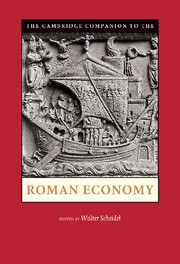Book contents
- Frontmatter
- Contents
- List of Figures
- Note on the Contributors
- Abbreviations
- The Roman world at the time of Marcus Aurelius
- 1 Approaching the Roman economy
- Part I Theory
- Part II Labor
- Part III Production
- Part IV Distribution
- Part V Outcomes
- 15 Physical well-being
- 16 Post-Roman economies
- Further reading*
- Bibliography
- Index
16 - Post-Roman economies
from Part V - Outcomes
Published online by Cambridge University Press: 05 February 2013
- Frontmatter
- Contents
- List of Figures
- Note on the Contributors
- Abbreviations
- The Roman world at the time of Marcus Aurelius
- 1 Approaching the Roman economy
- Part I Theory
- Part II Labor
- Part III Production
- Part IV Distribution
- Part V Outcomes
- 15 Physical well-being
- 16 Post-Roman economies
- Further reading*
- Bibliography
- Index
Summary
Any attempt at providing a synthesis of the salient characteristics and chronological development of ‘post-Roman’ economies, which will be taken here to begin from the fifth century ce, is complicated by the extent to which change varied across space and time. The most meaningful and revealing approach to this infinite variety lies in extended and comparative regional study, as has recently been magisterially demonstrated. Within the confines of an overview, however, one can only try to encapsulate this general pattern of fragmentation within a unitary framework of analysis, notwithstanding the schematic superficiality that this inevitably involves. In outline, a familiar distinction between the political destinies of the two halves of the empire, the fragmented, newly-barbarian West and the integrated and lately-flourishing East, can readily be carried over into the economic sphere because of the importance of the fiscal interests of the Roman state in shaping the dynamics of production and exchange. In neither case, however, was any radical economic transformation immediately and generally triggered by ‘the fall of Rome.’ In the East, the late antique boom encouraged by the foundation of Constantinople, and implicit in the expansion of the extent and intensity of rural settlement in several regions, continued unabated. In the West, with the notable exception of Britain, where the involution of the Roman system was complete within little more than a generation, the various successor-states entered upon a species of economic half-life, in the sense that they emitted Roman-ness in various aspects of their fiscal organization and patterns of exchange until the later seventh century, but in steadily diminishing quantities. This fading but still recognizably post-Roman pattern would be significantly complicated, but not fundamentally altered, by the absorption of Africa and parts of Italy back into the imperial orbit as a result of Justinian's reconquests. In the seventh century, however, the eastern empire underwent a military-political crisis of its own, at once more concise in its nature and less decisive in its outcomes. The Byzantine state survived, in shrunken form, and a variant of fiscal organization was maintained by the Umayads in the territories over which they had assumed control.
- Type
- Chapter
- Information
- The Cambridge Companion to the Roman Economy , pp. 334 - 360Publisher: Cambridge University PressPrint publication year: 2012



